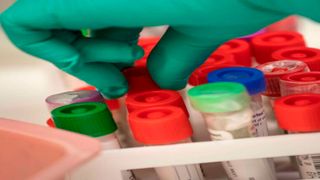
The discovery by Kemri is a significant development as there are very few antibiotics specifically licensed to treat multidrug-resistant infections in babies.
| Courtesy | AFPHealthy Nation
Premium
Kemri’s drug can treat infant blood infection, cut down mortality rate
Researchers at the Kenya Medical Research Institute (Kemri-Wellcome Trust Research Programme) have found that a safe dose of the antibiotic Fosfomycin, can be used to treat babies with neonatal sepsis (a blood infection that occurs in infants younger than 90 days old).
This comes after results from a clinical trial conducted in Kilifi between March 2018 and February 2019 showed that a 150 mgs dose of the drug intravenously administered to babies who are seven days old and above is effective.
According to Kemri, neonatal sepsis is a life-threatening condition that requires prompt detection and treatment as newborns - babies under 28 days old - are particularly vulnerable as their underdeveloped immune systems struggles to fight infections.
“This is complicated by drug resistance, as up to 40 per cent of bacterial infections are resistant to standard treatments. Many newborns die if they don’t get timely treatment, while others may have significant long-term consequences,” the research institute explained in an official statement.
“For those below that age they should get 100 mgs of the dose.
This is a significant development as there are very few antibiotics specifically licensed to treat multidrug-resistant infections in babies.
“Our NeoFosfo trial investigated the pharmacokinetics (PK) and safety of Fosfomycin in 120 babies aged under 28 days who were hospitalized with clinically diagnosed sepsis at the Kilifi County hospital in Kenya. “
“The PK studies define which dose to use in babies,” Dr Christina Obiero the lead clinical investigator and medical doctor at KEMRI told the Nation in an exclusive interview.
She explained why the findings are crucial to the trial that saw the drug used in babies in the country for the first time.
“The World Health Organisation (WHO) encourages repurposing of antibiotics like Fosfomycin to combat antimicrobial resistance (AMR) in babies and adults because we have a major challenge in dealing with AMR as a country, continent and globally. It is an antibiotic that was discovered in the 70’s and hasn’t been used much but is used in developed countries to treat infections in the blood stream and urinary tract infections,” Dr Obiero noted.
The now off-patent potentially inexpensive antibiotic has been identified by WHO as ‘critically important’.
Dr Obiero observes that one in every five AMR deaths in 2019 occurred in children under five years old.
“These deaths could have been prevented.
“Currently there are limited antibiotics in the pipeline. Safe and affordable antibiotic combinations effective against bacteria causing sepsis in babies are needed to improve survival. Our results are significant as they provide evidence that Fosfomycin is safe and can now be taken forward into further clinical trials focusing on improving mortality outcomes for sepsis in babies,” the clinical investigator told the Nation.
In a past interview, Dr Evelyn Wesangula who is in charge of the AMR programme at the Ministry of Health (MoH), explained that AMR occurs when microorganisms are no longer able to be suppressed or killed by antimicrobial agents.
“The situation is worrying in Kenya. When the lab results come out and you have 70 per cent resistance, it is very worrying and leaves us with little or no option to discard that drug and pick up another drug yet. Looking at the population and availability of these drugs, we are not as privileged as countries in the west that have access to cheap and affordable medical care.
“If the drug is prohibitive, a patient is tempted to buy half a dose, they might also go and never come back for a second dose. By exposing the microorganisms to lower doses, we are giving them an opportunity to grow and mutate then develop resistance overtime,” said Dr Wesangula.
Last month, new data published by the Global Research on Antimicrobial Resistance (GRAM) showed that at least 1.27 million deaths per year are directly attributable to AMR, showing the need for urgent action from policymakers and health communities to avoid further preventable deaths.
“The GRAM report estimates are much higher in Sub-Saharan Africa but the report does not breakdown the data per country because of limited diagnostic capability and surveillance in the region,” Mr Raphael Chanda, a senior policy advisor at ReAct Africa (a global AMR network), explained.
This was based on estimates across 204 countries and territories, meaning the report provides the most comprehensive estimate of the global impact of AMR to date.
“AMR is a leading cause of death globally, higher than HIV/AIDs or Malaria, Sub-Saharan Africa faces the highest burden, with 255,000 deaths due to AMR in just one year and leading pathogens are Streptococcus pneumoniae (40,400 deaths attributable to AMR) and Klebsiella pneumoniae (50,800 deaths attributable to AMR).
“In 2019, 129,000 deaths attributable to AMR in Sub-Saharan Africa were in children under the age of 5, including a high number of infections from Escherichia Coli, usually acquired through contaminated food and water,” the GRAM paper highlighted.
Tim Jinks, the Head of Intervention, Infectious Disease at Wellcome Trust who commissioned the research for the report believes that it is time for African leadership to step forward and give African solutions in combating AMR.
“Countries are not prioritizing the implementation of their national action plans and now the GRAM report should serve as a call to action. By last year there were 39 countries that had developed their plans but only a few have implemented them.
The numbers with regards to paediatric infections are now very alarming,” he told the Nation.





